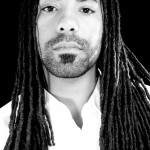“Touch: A Letter to the Mother”
By: L. Lamar Wilson
I’ve driven 654 miles without sleep to make you better,
but when I ask how you feel & you thrust your breast
within my grasp & say See, it’s fine, I see it’s not. Cool!
I lie, then recoil. But you never have. Not when I came
to you, instead of Daddy, to show hair down there. Not
when I followed you, finally bra-free, to the bathroom
during commercial breaks to debate whodunit on The Young
& the Restless or to ask which jeans best showcased my assets.
Not when I danced around the house naked as a jaybird,
you’d say, never laughing at my Funny Girl monologues.
You didn’t turn me away when I said His name is Johnnie
& I love him, & you never said Brown boys can’t be sissies, baby,
though I wish you had, since now a lump the size of the head
of a tack may take away the only one who hasn’t recoiled
at what comes naturally to me. Your eyes mirror mine
at the sight of what something so small can do: like a lump,
like a lie. You’re OK, it’s OK slips from my lips & I reach
out & touch your scar to assure us the enemy lurking
will not bring shame where shame has no home.
“Touch: A Letter to the Mother,” first published in Obsidian as “Touch,” was written after Terrance Hayes’s poem of the same title from his 2002 collection, Hip Logic.
__________________________
L. Lamar Wilson is the author of Sacrilegion, selected by Lee Ann Brown for the 2012 Carolina Wren Press Poetry Series. Poems in the collection have been published in such journals and anthologies as African American Review, jubilatand The 100 Best African American Poems, edited by Nikki Giovanni; have won the Beau Boudreaux and Emily Morrison poetry prizes; and were nominated for the Pushcart Prize. Wilson, a Cave Canem fellow, is a North Florida native and award-winning copy editor for such publications as the Atlanta Journal-Constitution, The Washington Post and The New York Times. He completed his MFA in creative writing at Virginia Tech and undergraduate work in newspaper journalism at Florida A&M University during its Times “College of the Year” era. Wilson is a doctoral fellow at the University of North Carolina at Chapel Hill, studying African American and multi-ethnic American poetics.


4 Comments